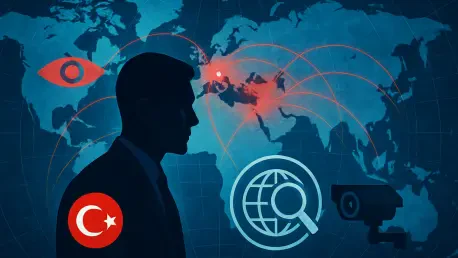In an era defined by geopolitical turbulence and rapid technological advancements, Turkey’s intelligence apparatus, led by the National Intelligence Organization (MİT), has emerged from a historically opaque past to become a dynamic force on the global stage, marking a significant shift in its role and influence. Once associated with secrecy and domestic control, MİT is now at the forefront of tackling modern threats like terrorism, cyber warfare, and regional instability, aligning seamlessly with Turkey’s ambitious foreign policy objectives. This transformation is not merely a domestic overhaul; it represents a strategic repositioning of Turkey as a formidable regional power, where intelligence serves as a critical tool in shaping international outcomes. From covert operations in conflict zones to the adoption of cutting-edge surveillance technologies, Turkish intelligence is carving out a new identity in a world that demands agility and foresight. Yet, this evolution prompts pressing questions about the delicate balance between ensuring national security and safeguarding civil liberties, both within Turkey and beyond its borders. How has MİT transitioned from a shadowy entity of state control to a pivotal global actor, and what implications does this hold for Turkey’s future? Delving into this remarkable journey uncovers not only the agency’s operational growth but also the broader impact on international relations and domestic governance, setting the stage for a deeper exploration of its role in today’s complex landscape.
Unraveling a Shadowy Past
The history of Turkish intelligence, rooted in the establishment of the National Security Service in 1926, is marked by a legacy of secrecy that shaped public perception for decades. Later reorganized as MİT in 1965, the agency became deeply entwined with Turkey’s tumultuous political landscape, particularly during the military coups of the 20th century. Throughout the Cold War era, MİT was often seen as an extension of military-dominated regimes, tasked with suppressing dissent and monitoring political adversaries rather than prioritizing broader national security. This role fostered a deep-seated mistrust among the Turkish populace, as the agency’s actions were frequently shrouded in ambiguity. Scandals, such as the 1996 Susurluk incident that revealed alleged connections between intelligence operatives and organized crime, further cemented the perception of MİT as a shadowy entity more focused on state control than public welfare. This historical backdrop of opacity and controversy provides a critical context for understanding the urgent need for reform, as the agency’s past actions left a lasting imprint on its reputation both domestically and abroad.
As this legacy of distrust persisted, it became evident that transforming MİT into a credible institution would require addressing the sins of its past while adapting to contemporary challenges. The agency’s historical involvement in political repression, particularly during periods of unrest like the conflicts with Kurdish groups in the 1990s, often implicated it in human rights concerns and extrajudicial measures. These actions, while sometimes justified under the guise of national security, eroded public confidence and painted MİT as a tool for maintaining power rather than protecting citizens. The weight of this reputation posed significant hurdles as Turkey entered the 21st century, with growing demands for transparency and accountability in state institutions. Understanding this historical narrative is essential to appreciating the scale of MİT’s subsequent reforms, as the agency sought to redefine its purpose amidst a backdrop of skepticism. This journey from shadows to a more open and strategic role reflects not only internal changes but also Turkey’s evolving position in a globalized world where intelligence must serve broader, more complex objectives.
Embracing Technological Innovation
The dawn of the 21st century ushered in a pivotal era of modernization for MİT, characterized by a deliberate shift toward technological advancement under influential leadership figures like Hakan Fidan. Recognizing the evolving nature of security threats, the agency established dedicated cyber intelligence units to combat hacking, online disinformation, and radicalization efforts by terrorist organizations. The integration of drone technology, exemplified by the domestically produced Bayraktar TB2, has revolutionized surveillance capabilities, enabling real-time data collection in volatile regions such as northern Iraq and Syria. This technological leap has positioned MİT alongside global intelligence leaders, allowing it to address threats from groups like the PKK and ISIS with greater precision through data analytics and predictive modeling. Such advancements signify a departure from traditional methods, aligning Turkish intelligence with the digital demands of modern warfare and security, while also enhancing its operational efficiency on multiple fronts.
However, this rapid embrace of technology brings with it a set of ethical dilemmas that cannot be overlooked in assessing MİT’s transformation. The expansion of surveillance capabilities, while effective in countering threats, raises significant concerns about individual privacy and the potential for misuse against civilians. As digital tools enable mass data collection, the risk of infringing on personal freedoms grows, prompting questions about the oversight mechanisms in place to prevent abuse. The global discourse on balancing security with civil liberties, evident in debates over programs like the NSA’s surveillance initiatives, mirrors the challenges faced by MİT in maintaining public trust. How the agency navigates this delicate equilibrium will be crucial in shaping its credibility, not just within Turkey but also in the eyes of international observers who scrutinize the ethical implications of such power. This technological evolution, while a cornerstone of MİT’s new era, underscores the need for robust safeguards to ensure that progress does not come at the expense of fundamental rights.
Forging a Global Footprint
MİT’s role has expanded dramatically beyond Turkey’s borders, positioning it as a central pillar of the country’s assertive foreign policy in regions marked by conflict and instability. No longer confined to domestic concerns, the agency has orchestrated covert operations and provided intelligence support in areas like Syria, where it aids Turkish-backed forces against both ISIS and Kurdish militias viewed as threats. Similarly, in Libya, MİT’s contributions, including drone support and critical intelligence, have bolstered the UN-recognized Government of National Accord, showcasing Turkey’s ambition to influence outcomes far from its immediate vicinity. These actions in the Caucasus and other strategic zones further illustrate how Turkish intelligence has become an active participant in shaping regional dynamics, reflecting a bold shift toward projecting power and securing national interests on an international scale. This global presence marks a significant evolution from MİT’s historically inward focus, aligning with Turkey’s vision of itself as a key geopolitical player.
Yet, this assertive international stance is not without its complications, as MİT’s operations often stir tensions with neighboring countries and global powers, challenging Turkey’s diplomatic relations. While interventions in conflict zones enhance strategic clout, they risk provoking backlash from nations wary of Turkey’s growing influence, such as Egypt and Saudi Arabia, or straining ties with NATO allies over divergent interests. The delicate balance of advancing national objectives through intelligence-driven actions while avoiding diplomatic isolation remains a persistent concern. Moreover, the visibility of MİT’s role in foreign policy underscores the need for careful calibration to prevent overextension, as missteps could undermine Turkey’s credibility on the world stage. This duality of opportunity and risk defines the agency’s global footprint, highlighting the intricate interplay between intelligence operations and international diplomacy as Turkey navigates its path toward greater regional dominance.
Navigating Domestic Challenges
At the domestic level, MİT’s enhanced mandate, particularly following the restructuring after the 2016 coup attempt, has solidified its position as a cornerstone of Turkey’s national security framework under direct presidential oversight. This shift has enabled swift and decisive actions against perceived threats, with high-profile operations demonstrating the agency’s efficiency in neutralizing risks, including the rendition of suspects from abroad. The focus on countering internal dangers, such as those linked to alleged coup plotters, has been lauded by many as essential for state stability in a country that has faced significant unrest. However, this centralization of power also amplifies the agency’s influence over political landscapes, raising questions about the broader implications of its role in shaping governance. As MİT operates with increased autonomy, its actions resonate deeply within Turkey’s societal and political spheres, often sparking polarized reactions among different segments of the population.
Equally significant is the growing concern over potential overreach, as MİT’s expanded surveillance powers and legal protections fuel debates about accountability and the erosion of democratic principles. Reports of targeting journalists, activists, and opposition figures under the guise of national security have intensified fears that intelligence capabilities might be misused to silence dissent rather than protect the public. Legal reforms granting the agency immunity from prosecution for certain actions further complicate the push for transparency, as critics argue that such measures risk fostering an environment of unchecked authority. This tension between safeguarding the state and preserving civil liberties remains a critical flashpoint, with opinions sharply divided on whether MİT’s actions represent a necessary defense mechanism or a slide toward authoritarian control. Addressing these domestic challenges will be vital for the agency to maintain legitimacy while fulfilling its security mandate.
Driving Regional and Global Strategy
Turkey’s strategic location as a bridge between Europe and Asia places MİT at the epicenter of addressing multifaceted regional challenges, from managing refugee crises to countering rivalries with nations like Iran and Greece. The agency’s intelligence operations provide crucial insights that shape Turkey’s responses to complex issues, such as maritime disputes in the Eastern Mediterranean and the influx of millions of displaced individuals from conflict zones like Syria. By informing policy decisions with actionable data, MİT helps position Turkey as a stabilizing force in a volatile region, often navigating delicate balances between competing interests. This role extends beyond immediate security concerns, influencing economic and humanitarian strategies that are vital for maintaining Turkey’s standing amid regional turbulence. The agency’s contributions in this arena underscore its importance as a linchpin of national strategy, reflecting a broader mission to secure both territorial and geopolitical interests.
Furthermore, MİT’s adaptability to emerging threats, such as cyber warfare and hybrid conflicts, will be paramount in sustaining Turkey’s relevance in an increasingly unpredictable global landscape. The agency’s involvement in diplomatic mediation, exemplified by efforts to facilitate agreements like the grain export deal between Ukraine and Russia, enhances Turkey’s image as a regional broker capable of bridging divides. As digital and non-traditional security challenges grow, with state-sponsored cyberattacks becoming more frequent, MİT must continue to evolve its capabilities to stay ahead of adversaries. This forward-looking approach is essential for tackling the complexities of modern geopolitics, where intelligence serves not only as a defensive mechanism but also as a tool for proactive engagement. The agency’s ability to anticipate and respond to these shifts will likely determine Turkey’s success in maintaining influence over regional dynamics while contributing to global stability.
Reflecting on a Transformative Path
Looking back, the journey of Turkish intelligence, particularly through the lens of MİT’s evolution, reveals a remarkable shift from a past mired in secrecy to a present defined by strategic global engagement. The agency’s historical association with political control during Turkey’s turbulent periods gave way to a focus on modernization, as technological advancements in cyber intelligence and drone surveillance redefined its operational scope. Internationally, MİT played a crucial role in extending Turkey’s influence through covert operations and intelligence support in conflict zones, while domestically, its enhanced powers sparked debates over the balance between security and liberty. Geopolitically, the agency stood as a key driver of Turkey’s regional ambitions, navigating complex rivalries and emerging threats with calculated precision. This transformative path, though fraught with challenges, showcased a commitment to adapting to the demands of a changing world, positioning Turkish intelligence as a significant force in international affairs.
Moving forward, the emphasis must be on establishing robust oversight mechanisms to ensure that MİT’s expanded capabilities do not compromise democratic values, both at home and in its global endeavors. Strengthening transparency and accountability will be critical to rebuilding public trust, particularly in light of past controversies that linger in collective memory. Additionally, fostering international partnerships while maintaining strategic autonomy can help mitigate diplomatic tensions arising from Turkey’s assertive policies. Investing further in cybersecurity and innovative technologies will prepare the agency for future threats, ensuring it remains a step ahead in a digital age. By addressing these areas with deliberate focus, Turkish intelligence can solidify its role as a constructive player in shaping not just regional outcomes but also a more secure and balanced global order.









